Mazda CX-30 VS Genesis G80 – Specs, Efficiency & Price Comparison
Find out now which car fits your needs better!
The Mazda CX-30 (SUV) is powered by a Petrol MHEV engine and comes with a Manuel or Automatic transmission. In comparison, the Genesis G80 (Sedan) features a Petrol or Electric engine and a Automatic gearbox.
When it comes to boot capacity, the Mazda CX-30 offers 430 L, while the Genesis G80 provides 424 L – depending on what matters most to you. If you’re looking for more power, you’ll need to decide whether the 186 HP of the Mazda CX-30 or the 370 HP of the Genesis G80 suits your needs better.
There are also differences in efficiency: 5.70 L vs 19.10 kWh8.30 L. In terms of price, the Mazda CX-30 starts at 25200 £, while the Genesis G80 is available from 46200 £.
Compare all the key specs now and find out which model fits your lifestyle best!
Mazda CX-30
The Mazda CX-30 effortlessly combines sleek design with a sense of adventure, making it an appealing choice for urban explorers and countryside enthusiasts alike. Inside, the cabin is thoughtfully designed, offering both comfort and cutting-edge technology to enhance the driving experience. Its performance on the road is agile, providing a smooth and engaging journey for drivers and passengers.
details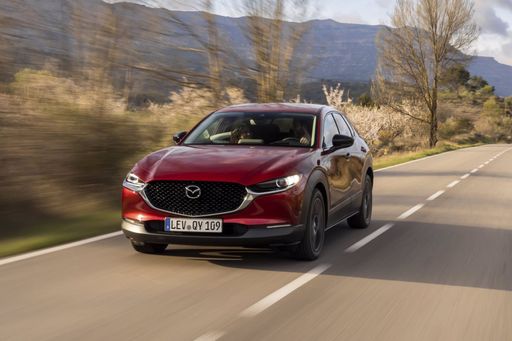 @ de.mazda-press.com
@ de.mazda-press.com
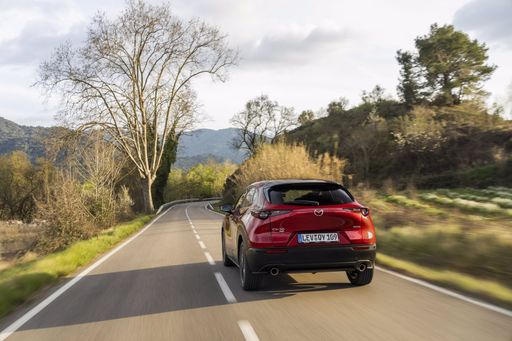 @ de.mazda-press.com
@ de.mazda-press.com
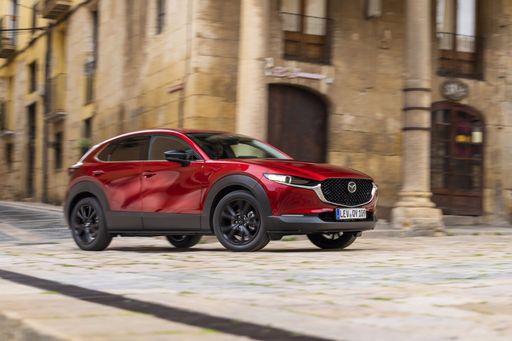 @ de.mazda-press.com
@ de.mazda-press.com
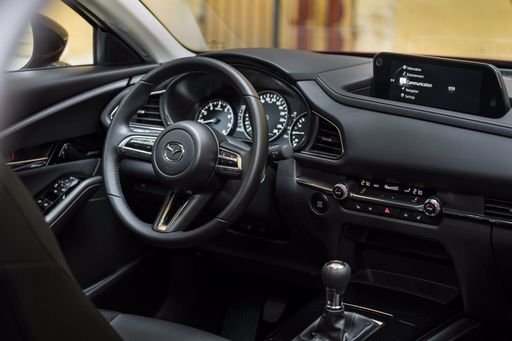 @ de.mazda-press.com
@ de.mazda-press.com
Genesis G80
The G80 captivates with its elegant design and luxurious interior, offering a harmonious blend of style and comfort. Its refined driving experience is complemented by cutting-edge technology that enhances both safety and convenience. With a commitment to performance and sophistication, the G80 stands out as a premier choice for those seeking a refined sedan.
details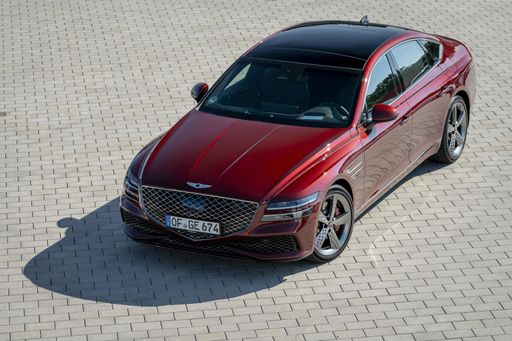 @ Genesis
@ Genesis
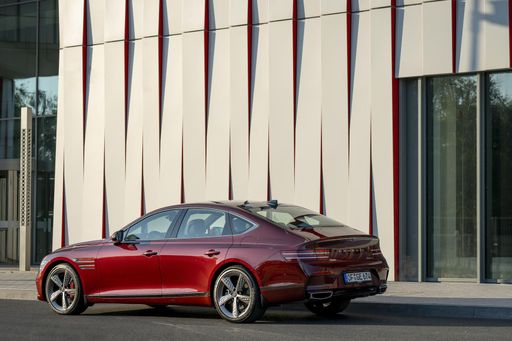 @ Genesis
@ Genesis
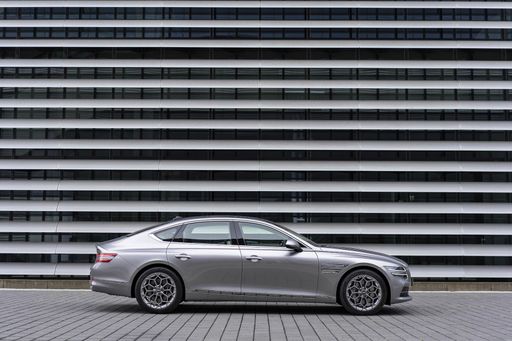 @ Genesis
@ Genesis
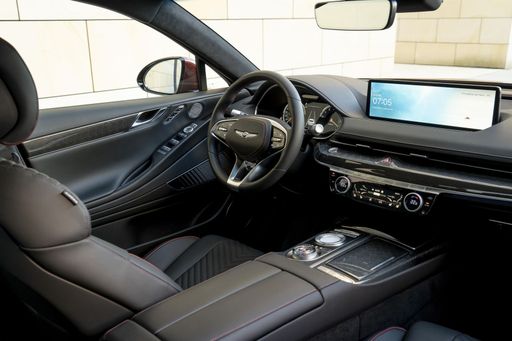 @ Genesis
@ Genesis

|

|
|
|
|
Costs and Consumption |
|
|---|---|
|
Price
25200 - 36800 £
|
Price
46200 - 62100 £
|
|
Consumption L/100km
5.7 - 6.6 L
|
Consumption L/100km
8.3 - 9.1 L
|
|
Consumption kWh/100km
-
|
Consumption kWh/100km
19.10 kWh
|
|
Electric Range
-
|
Electric Range
520 km
|
|
Battery Capacity
-
|
Battery Capacity
87.20 kWh
|
|
co2
129 - 148 g/km
|
co2
0 - 205 g/km
|
|
Fuel tank capacity
48 - 51 L
|
Fuel tank capacity
65 L
|
Dimensions and Body |
|
|---|---|
|
Body Type
SUV
|
Body Type
Sedan
|
|
Seats
5
|
Seats
5
|
|
Doors
5
|
Doors
4
|
|
Curb weight
1455 - 1587 kg
|
Curb weight
1860 - 2325 kg
|
|
Trunk capacity
422 - 430 L
|
Trunk capacity
354 - 424 L
|
|
Length
4395 mm
|
Length
4995 - 5005 mm
|
|
Width
1795 mm
|
Width
1925 mm
|
|
Height
1540 mm
|
Height
1465 - 1470 mm
|
|
Payload
458 - 496 kg
|
Payload
445 - 520 kg
|
Engine and Performance |
|
|---|---|
|
Engine Type
Petrol MHEV
|
Engine Type
Petrol, Electric
|
|
Transmission
Manuel, Automatic
|
Transmission
Automatic
|
|
Transmission Detail
Schaltgetriebe, Automatikgetriebe
|
Transmission Detail
Automatikgetriebe
|
|
Drive Type
Front-Wheel Drive, All-Wheel Drive
|
Drive Type
Rear-Wheel Drive, All-Wheel Drive
|
|
Power HP
140 - 186 HP
|
Power HP
304 - 370 HP
|
|
Acceleration 0-100km/h
8.3 - 10.3 s
|
Acceleration 0-100km/h
4.9 - 6.3 s
|
|
Max Speed
191 - 204 km/h
|
Max Speed
225 - 250 km/h
|
|
Torque
238 - 240 Nm
|
Torque
422 - 700 Nm
|
|
Number of Cylinders
4
|
Number of Cylinders
4
|
|
Power kW
103 - 137 kW
|
Power kW
224 - 272 kW
|
|
Engine capacity
1998 - 2488 cm3
|
Engine capacity
2497 cm3
|
General |
|
|---|---|
|
Model Year
2024
|
Model Year
2021 - 2022
|
|
CO2 Efficiency Class
D, E
|
CO2 Efficiency Class
G, A
|
|
Brand
Mazda
|
Brand
Genesis
|
Mazda CX-30
The Mazda CX-30: Where Innovation Meets Efficiency
The Mazda CX-30 stands as a testament to Mazda's commitment to blending the best of technology and design. Positioned as a subcompact SUV, the CX-30 delivers the practicality of an SUV with the agile driving dynamics of a smaller vehicle. As we delve into its technical and innovative aspects, the CX-30 showcases why it's a formidable choice in today's competitive automotive market.
Engine and Performance: Power Meets Efficiency
The heart of the Mazda CX-30 lies in its sophisticated engine offerings. At its core, the e-SKYACTIV-X engines provide a unique balance of performance and fuel efficiency. With 186 PS at your disposal, these engines optimise the combustion process, reducing both fuel consumption and emissions. The engine's mild-hybrid system further enhances its efficiency by capturing energy during braking, making it one of the more environmentally conscious choices on the market.
Transmission and Drivetrain Options
Buyers have the flexibility to choose between a manual or an automatic transmission, catering to diverse driving preferences. The available all-wheel drive (AWD) system provides enhanced stability and control, particularly useful in variable weather conditions or challenging terrains. Those preferring a classic driving experience can opt for the front-wheel drive (FWD) variants, which still deliver impressive traction and handling.
Design and Dimensions
The Mazda CX-30's dimensions—4395 mm in length and 1795 mm in width—offer a spacious and comfortable interior while maintaining a sleek and modern exterior design. Its aerodynamic form not only enhances its aesthetic appeal but also contributes to improved performance and fuel efficiency. The interior, adorned with high-quality materials, reflects Mazda’s dedication to creating a premium driving experience.
Interior Comfort and Technology
Inside, the CX-30 does not disappoint. With a cabin that seats five comfortably, it strikes an excellent balance between style and practicality. The infotainment system, replete with intuitive controls and connectivity options, ensures that drivers remain connected and entertained on the go. Additionally, advanced safety features bolster the confidence of any journey, safeguarding occupants and pedestrians alike.
Pricing and Model Variants
The Mazda CX-30 is offered in a variety of model configurations, each catering to different budgetary and feature preferences. The entry-level models provide excellent value, while higher trims, such as the Exclusive-Line and Takumi, offer luxurious enhancements and additional technology features. With pricing from €28,940 to €42,390, the CX-30 positions itself as an attractive option in its segment.
Conclusion: The Ideal Mix of Performance and Practicality
In summary, the Mazda CX-30 emerges as a versatile and appealing option for those seeking a compact SUV that does not compromise on performance or sophisticated engineering. Its combination of innovative technology, efficient powertrains, and driver-centric features make it a worthy contender in its class. Whether navigating urban landscapes or exploring rural roads, the CX-30 delivers an engaging and reassuring drive.
Genesis G80
The Genesis G80 has swiftly established itself as a beacon of luxury and innovation in the automotive world. Blending elegant design with cutting-edge technology, this premium sedan delivers an unparalleled driving experience that speaks to the heart of car enthusiasts and luxury drivers alike. Let's delve into the technical aspects and innovations that make the G80 an exceptional choice.
Design and Comfort
At first glance, the Genesis G80 captivates with its sleek and sophisticated profile. The aerodynamic silhouette not only enhances its aesthetic appeal but also contributes to its impressive performance. Inside, the cabin is a sanctuary of comfort, featuring high-quality materials, spacious seating for five, and a meticulously designed layout that maximizes driver and passenger comfort. The thoughtful ergonomics and premium finishes ensure that every journey, whether short or long, is enjoyable.
Powertrain Options
The G80 offers a range of engine choices, catering to diverse driver preferences. The standard option is the 2.5T petrol engine, producing an impressive 304 horsepower, paired with an automatic transmission. This powertrain is available in both rear-wheel drive and all-wheel drive configurations, allowing drivers to select the setup that best suits their needs. For those seeking an electrifying option, the G80 also comes in an electrified version boasting 370hp and an electric range of 520 kilometers, catering to the eco-conscious driver.
Performance and Efficiency
Performance is at the forefront of the G80's engineering. With rapid acceleration capabilities—reaching 0-100 km/h in just 6 seconds for petrol models and an astonishing 4.9 seconds for the electrified variant—it signifies the perfect marriage of responsiveness and refinement. Fuel efficiency ratings stand at 8.3 L/100km for the rear-wheel drive models, and 9.1 L for all-wheel drive variants, making this luxury sedan both powerful and economical.
Advanced Technology
Innovation in the G80 extends to its technology suite, which includes an intuitive infotainment system accessible via a large touchscreen interface. The system integrates connectivity features such as Apple CarPlay and Android Auto, ensuring that drivers remain connected while on the move. Additionally, the G80 incorporates advanced driver-assistance features to provide a safer driving experience, including adaptive cruise control, lane-keeping assistance, and a 360-degree camera system.
Safety and Reliability
Genesis places a high priority on safety and reliability, and the G80 is no exception. Equipped with a robust structure and multiple airbag systems, it consistently earns high ratings in crash tests. The inclusion of a comprehensive suite of safety features further enhances the confidence of both driver and passengers, making it a reliable choice for families and professionals alike.
Conclusion
In the competitive landscape of luxury sedans, the Genesis G80 emerges as a compelling choice, harmonizing performance, luxury, and technological innovation. With its remarkable engine options, a thoughtfully designed interior, and an impressive array of safety and convenience features, it’s no wonder the G80 has captured the admiration of car enthusiasts and critics alike. Whether you’re sipping through city streets or cruising on the highway, the Genesis G80 promises an unrivaled driving experience.
The prices and data displayed are estimates based on German list prices and may vary by country. This information is not legally binding.
